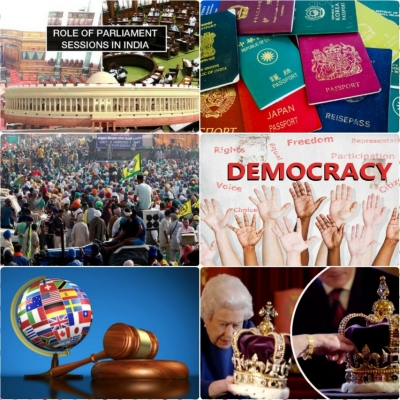
THE STATE
Throughout history, countries have been run by a variety of leaders and governments. At one time, heads of state were royalty, ruling with absolute authority. In many countries, power has now passed to the people, as democratic elections have replaced royal rule. Many citizens have the right to vote for their political leaders and to protest against them when necessary. Having won a place at the forefront of government, prime ministers and presidents run many world states.
- CITIZENSHIP
People born into a country or state are called its citizens. This gives them the right to protection by the government as well as the right to vote. Along with rights come responsibilities, and citizens are expected to abide by the laws of the land. Immigrants and refugees can sometimes become citizens of another country. Each country or state is identified by its national flag.
- LEGISLATURE
States have elected representatives who are responsible for making laws, known as legislating. Government members debate new policies or changes to existing laws. Once the laws have been agreed, they are officially drafted by the legislatures. These laws must then be followed by all citizens.
- PROTEST
If the citizens of a state or nation do not agree with the actions or policies of the ruling government, they sometimes rally together to stage a public protest. Often marching to the government’s headquarters, people voice their concerns in an attempt to bring about change.
- DEMOCRACY
In democratic societies, citizens have the opportunity to vote for their preferred candidate from a range of political parties. On Election Day, people cast their vote and the party with the majority is established as the new government.
- REPUBLICS
Countries that have a president as their head of state instead of a king or queen are called republics. Presidents can be elected by the citizens or appointed by the legislature, and usually act as head of the nation’s government.
- LAW AND ORDER
A country’s judges, collectively called the judiciary, make rulings on criminal allegations or civil disputes in courts of law. They interpret and uphold laws passed by the government before delivering their verdicts to the citizens involved. The law in most countries is upheld by a police force.
- MONARCHY
In the past, most countries were ruled by a king or a queen and, as head of state, the monarch’s word was considered law. Although some countries still maintain a monarchy, their role is mainly ceremonial. It is the elected government that generally takes responsibility for how the country is run.
Picture Credit : Google




